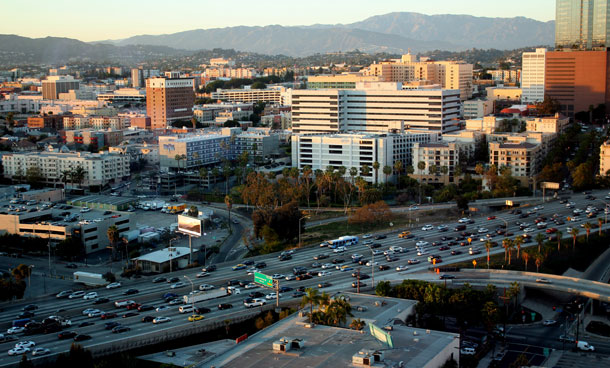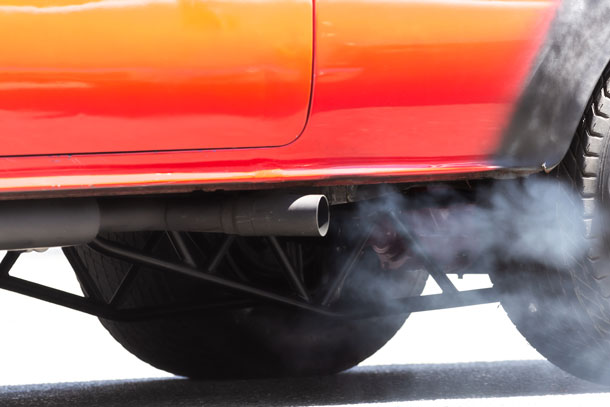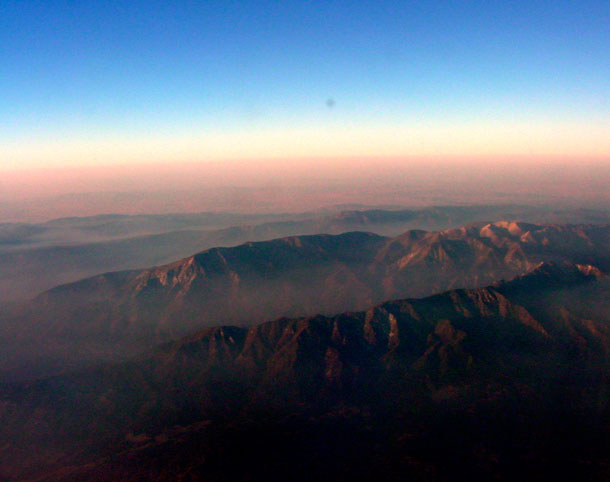Trump Fights California
Air Date: Week of October 4, 2019

California’s severe vehicle pollution and smog problems has put the state at the forefront of clean air policy. Thirteen other states have adopted California’s stricted tailpipe standards in order to reduce carbon emissions as well as smog. (Photo: Prayitno, Flickr, CC BY 2.0)
The Trump administration has revoked California’s waiver to set stricter vehicle emissions standards than federal rules require, and that more than a dozen other states have adopted, and California is already fighting back in court. The administration also opened Alaska’s Arctic National Wildlife Refuge to oil exploration. Vermont Law School Professor Pat Parenteau discusses these developments with host Steve Curwood.
Transcript
CURWOOD: From PRI and the Jennifer and Ted Stanley Studios at the University of Massachusetts Boston, this is Living on Earth. I’m Steve Curwood.
The Trump Administration is moving to revoke the permission California was granted nearly fifty years ago to enforce more stringent vehicle pollution standards under the Clean Air Act than the rest of the US. The Los Angeles basin was choking with smog back then, and though air quality has improved it still has concerning levels of air pollution. The 1970 California wavier opened the door for 14 other states, many in the Northeast, to also adopt those tougher vehicle pollution standards. And after the US Supreme Court ruled in 2007 that carbon dioxide is a pollutant the clean air act waiver has been a key tool to fight climate change. The Trump Administration is opposing many measures to address climate disruption, and its bid to hamstring efforts tied to the California Clean Air Act waiver is facing fierce opposition in the courts. We’re joined now by Vermont Law School professor Pat Parenteau to discuss this and other court room battles between the Trump Administration and conservation advocates. Welcome back to Living on Earth, Pat!
PARENTEAU: Thanks Steve, good to be here.
CURWOOD: So, the Trump administration wants to take away the waiver that California has had since what the 1970s to set its own car air pollution standards, what would it take for them to be able to do that?
PARENTEAU: Well, according to California it would take an amendment to the Clean Air Act, because currently there's no language in the Clean Air Act that would authorize the Trump administration to revoke the waiver that's been granted by the Obama administration. In fact, California has had about 50 different waivers granted over the course of the Clean Air Act. So this is the first time any administration has ever proposed to revoke a waiver for California. The Trump administration is arguing that their revocation of this rule prevents California from setting standards for the rest of the nation. That's that's the big argument. One state shouldn't dictate to the rest of the states. But here's the thing. The whole idea of the California waiver was to do exactly that. Congress of the United States gave California this authority, because California had some of the worst air quality in the country and still does. But also Congress said, if other states wish to join California, and agree to implement their standards, they can do so. So the Trump administration's argument is really with Congress not with California.
CURWOOD: Well now what there're 13 states that have adopted the tailpipe standards in California, what would happen to not just the Californians is but the residents of those other states if in fact, somehow the Trump administration is able to unwind the waiver?

California is fighting against the Trump Administration's attempts to revoke California's clean air waiver, which sets strict vehicle emissions standards. (Photo: Cindy Shebley, Flickr, CC BY 2.0)
PARENTEAU: Right? Well, you know, the 13 states that have agreed to implement California standards represent 40% of the car market in the United States. So these states are relying on California standards, not simply to help them achieve their own clean air objectives. Remember, air pollution travels across state lines, of course, so some states cannot achieve compliance unless other states comply with these standards, you take those standards away, you're going to interfere with jobs, and economic progress in some of these states. Because these cleaner, more efficient vehicles have been pretty good job producers. We might recall that the automakers were in bankruptcy when President Obama took office, and he had to bail them out with billions of dollars of taxpayers funding. One of the reasons the automakers were in such financial trouble was they were being out competed by more efficient vehicles coming from Asia and other parts of the world. So this is a real setback, in terms of economy as well as environment.
CURWOOD: Now, another thing that the Trump administration wants to do along these lines is to actually get rid of these stiffer car, mileage standards efficiency standards that the Obama administration had implemented.
PARENTEAU: Yes, Obama had targeted average car efficiency standards to be 55 miles per gallon by 2025 fleet of automobiles coming onto the market. And what the Trump administration wants to do is actually freeze standards back to 2020 levels, which is something less than 30 miles per gallon. And this would be a huge setback for fuel efficiency, and obviously, climate mitigation and carbon reduction. It's not justified economically, the Trump administration is claiming their rule will save consumers money but when you look at it from the standpoint of the savings realized over the life of these more efficient vehicles, the average would be $3,000 in savings from the higher fuel efficiency standards. So it's not an economically justified move and it's not an environmentally justified move.
CURWOOD: Why is the Trump administration doing this, then?
PARENTEAU: You know, part of it is the war that the Trump administration is having with California. I mean, just recently, they've issued an ultimatum that California improved the way it's implementing the Clean Air Act, the Clean Water Act, they're claiming that the homeless problem in San Francisco is worse than it is anywhere else in the country, and therefore, they're not meeting their water quality standards. And the odd thing is, or the ironic thing is, automakers didn't ask for this kind of dramatic rollback. They asked for some more flexibility in meeting some of the Obama standards. And four of the major automakers of course, have broken ranks with Trump and agreed to meet the California standards. And in payback for that the Department of Justice has opened an antitrust investigation against those four automakers that's unprecedented. So part of this is just nothing more than political warfare. It really doesn't have a whole lot to do with environmental policy, or economic policy.
CURWOOD: How much does it have to do with oil? It would seem that the large oil companies would benefit. If efficiency standards are lower, they get to sell more gasoline.
PARENTEAU: Well, that's true. California does have zero emission vehicles and electric vehicles as part of their plan. But in the short run, the more that you drive, the more gas you buy. That's certainly true.
CURWOOD: By the way, in the middle of all this, the Trump administration is threatening to remove California's Federal Highway funding saying that it hasn't addressed air pollution properly. Tell me more about this and how it could possibly make sense.
PARENTEAU: Yeah, well, that's sort of the height of hypocrisy, frankly, on the one hand, the Trump administration is telling California you don't need these stricter standards. You can't dictate environmental and economic policy to the nation. And then on the other hand, Trump administration says you're not doing enough to clean up your air, it can't be both. And in fact, California has always been the leader in the United States in innovating clean air technology, the reason we were able to get the lead out of the air, in large part is because of the catalytic converter and that came right out of California. I mean, the threat of taking away highway funds. That's that's actually not happened for as long as I can remember. So some of these bullying tactics may not be seriously followed up, California may be able to go to court and challenge some of the efforts to cut off highway fundings. I don't see that some of these moves or threats by the Trump administration are necessarily going to come to fruition we'll have to see.

California is susceptible to smog accumulation due to a large number of vehicles and the location of major metropolitan areas in basins or valleys that trap air circulation. (Photo: Traveling Otter, Flickr, CC BY SA 2.0
CURWOOD: I want to shift topics here, although it does involve oil. Because in the Tax Cuts and Jobs Act that was passed by the Trump administration in 2017, not only did it change tax rates, but it opened up part of the Arctic National Wildlife Refuge there up in the far north of Alaska to oil and gas exploration. And a recent environmental impact statement by the Bureau of Land Management says that 69 of 157 birds in that coastal plain can go extinct as a result of oil and gas drilling yet seems like the Trump administration is pushing ahead. I don't get it. How is it that a government agency can say that they're going to be a bunch of extinctions, and yet approve oil and gas drilling?
PARENTEAU: Right, so this is the coastal plain of Alaska, it's about 1.6 million acres, it's the last truly untouched part of the American landscape that we have, there literally is no development, no significant human presence, the Gwich'in, people use the Alaska coastal planes very heavily for subsistence hunting, caribou, and other things. But there's no mark of human habitation whatsoever. And so yeah, here comes the Trump administration's proposal now to lease the whole thing. I mean, when they looked at the environmental impacts, they considered a range of development options, and wouldn't you know it, they picked the one to develop the whole 1.5 million acres for oil and gas exploration, that's at least the first step in this process. And it's, again, counter to everything that science is telling us, which is that we need to leave a lot of these fossil fuel reserves in place. Why on earth, would you be going to one of the most sensitive, biologically important parts of America to look for oil, when we still have a glut of oil coming from lots of other places on public lands and offshore? The answer is, on this one, this is what the delegation in Alaska wants. And this is what the delegation has been given from the Trump administration. But the irony here is, you could go out there start building these roads. And these drilling pads start punching holes into the permafrost looking for oil. And if it comes up empty, if it comes up that there really isn't that much commercially recoverable oil, we will have done all this damage to this pristine wilderness for nothing.
CURWOOD: And if there is oil, and it's extracted, there'll be plenty of damage as well, it sounds like.
PARENTEAU: They'll even be more damage. And then of course, the question is how much revenue. This all began, as you pointed out, part of the tax bill, and the claim was that it could be billion dollars’ worth of oil underneath the coastal plane. But other analysts have looked at it and said, there's far less than that. And when you pencil it all out, according to taxpayers united of America, it's only about $20 million worth of net revenue to the government a drop in the bucket, shall we say, in terms of the debt that the country is facing?
CURWOOD: Let's walk quickly through now the legal options here, California I imagine is going to fight this move in court with ferocity there are plenty of lawyers to speak up for them. But in places like the Anwar dispute, how are things shaping up legally here, Pat?
PARENTEAU: Yeah, so I think the Trustees for Alaska is going to be the lead group bringing the lawsuits on behalf of the Gwich'en and other interested parties. Earth justice, of course, has a major office in Alaska, Natural Resources Defense Council is likely to be part of the team. I'm guessing there's going to be a fairly large team of lawyers. Defenders of Wildlife, this particular coastal plane, because of the loss of the pack ice, and sea ice in the Arctic, has become ever more critical for the polar bear survival in denting activities. And of course, we have the porcupine caribou herd, which is the largest caribou herd in the world. And this is their only caving grounds. So you're going to have a combination of wildlife groups, native peoples, and just a lot of people concerned about conservation of America's natural resources, jumping in on this lawsuit. So I think these leases could be tied up in litigation long enough that a new administration will have a chance to reverse direction on this.
CURWOOD: The track record of the Trump administration when it goes to court to try to deal with regulations or deregulating in the area of the environment isn't particularly good. What's their winning average so far?

The Porcupine Caribou herd migration is highly significant to nature and indigenous peoples in the Arctic, and the Arctic National Wildlife Reserve in Northern Alaska is a key part of the migration ecosystem. (Photo: Wally Gobetz,
AMNH: Hall of North American Mammals, Flickr, CC BY-NC-ND 2.0 )
PARENTEAU: Yeah, according to the New York University's Institute for Policy integrity, which tracks every single case, against the administration, they've lost more than 90% the challenges to the roll backs that they've been carrying out across the board on environmental issues. So in many respects, the administration doesn't seem to value very highly, crossing the T's and dotting the I's and making sure that their decisions are bombproof legally. And maybe part of the reason for that is they're out to disrupt government, environmental policy as much as they can. If the courts stop them, they'll turn to their base and say, well, we tried. You see, this is why we need more conservative federal judges, this is why I need a second term to pack the benches more. So regardless of win or lose, this is always a political game. It seems to me.
CURWOOD: Pat Parenteau is a former EPA attorney and professor at Vermont Law School. Thanks Pat.
PARENTEAU: Thanks Steve!
Links
Los Angeles Times Column: Can Trump legally revoke California’s clean air waiver? Probably not
Bloomberg | “Trump is not Wrong About California’s Smog but he is not Helping”
Reuters | Trump fight on California auto emissions could outlast presidency
Living on Earth wants to hear from you!
Living on Earth
62 Calef Highway, Suite 212
Lee, NH 03861
Telephone: 617-287-4121
E-mail: comments@loe.org
Newsletter [Click here]
Donate to Living on Earth!
Living on Earth is an independent media program and relies entirely on contributions from listeners and institutions supporting public service. Please donate now to preserve an independent environmental voice.
NewsletterLiving on Earth offers a weekly delivery of the show's rundown to your mailbox. Sign up for our newsletter today!
 Sailors For The Sea: Be the change you want to sea.
Sailors For The Sea: Be the change you want to sea.
 The Grantham Foundation for the Protection of the Environment: Committed to protecting and improving the health of the global environment.
The Grantham Foundation for the Protection of the Environment: Committed to protecting and improving the health of the global environment.
 Contribute to Living on Earth and receive, as our gift to you, an archival print of one of Mark Seth Lender's extraordinary wildlife photographs. Follow the link to see Mark's current collection of photographs.
Contribute to Living on Earth and receive, as our gift to you, an archival print of one of Mark Seth Lender's extraordinary wildlife photographs. Follow the link to see Mark's current collection of photographs.
 Buy a signed copy of Mark Seth Lender's book Smeagull the Seagull & support Living on Earth
Buy a signed copy of Mark Seth Lender's book Smeagull the Seagull & support Living on Earth

